
Related essays
Formation 1
Formation 2
Formation 3
Ice Age
Extra ecclesiam nulla salus.
Rugged Individualism
It has been said that "Man is a social animal", but it may be observed that, for a supposedly social animal, humans remain stubbornly independent-minded and obstreperous. If humans were inherently social animals, one would expect them to be fully adapted to the requirements of social life, and for criminality and deviance of every sort to be virtually unknown. Instead crime would seem to be almost ubiquitous, and our prisons are overflowing. And furthermore, if humans were by nature social animals, punctual and diligent and cheerful, why is it that it takes some 10 or more years of rigorous education to prepare children for the discipline of adult working life? Why do husbands and wives have to make solemn promises of fidelity, if the social institution of marriage is already the natural mode of their association? Why are there so many laws, very often with heavy penalties for infractions, when fully socialised humans would never dream of breaking any of them, and should have no need of law?
In the natural world of plants and animals, it seems that most species live independent, autonomous lives. Most plants harvest their own solar energy in their leaves, and draw up their own water and nutrients through their roots, and do not trade or share them with others of the same species. They may often be found together in the same places - in groves or forests -, but these are generally chance collections rather than formal societies. And the same is true of most animals, which hunt and feed themselves, only ever exhibiting care for their own infant offspring. Even those animals which form herds or schools are generally only modestly cooperative, with each animal living a largely autonomous life, feeding itself. It seems to be only a few animal species which form genuine dependent cooperative societies. Ants. Termites. Bees. Wolves. Lions. Monkeys. Humans. It seems that the greater bulk of living creatures are rugged individuals which depend on no assistance from any other creature.
And if species at some stage come to form societies, it seems reasonable to suppose that the individuals of any species begin by being capable of independent existence - and that before ants came to form colonies, individual ants were once able to live independent lives.
So it may be instructive to start with the opposite hypothesis, that man is not a social animal, and inquire how self-interested individuals might come to form societies with rules and hierarchies.
One might begin with an imaginary early human race which is made up, much like many creatures in the animal world, of ruggedly independent and autonomous individuals, who only associate with each other to mate, and who otherwise spend little time in each other's company. This is a pre-social humanity.
We might also imagine that these humans spend their time roaming the lands, drinking from springs and streams, eating fruits and vegetables and any insects and birds and fish that they can catch. We may imagine that they are naked, and have few or no possessions.
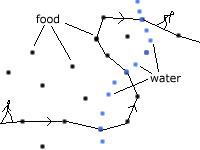 This wandering life is one in which individuals merely look for food and water. And it may be imagined that food and water are seldom located at the same place in a natural environment, but are found scattered here and there, so that the progress of a foraging individual man through a natural landscape will be a meandering path from date palm to lake to olive bush to spring.
This wandering life is one in which individuals merely look for food and water. And it may be imagined that food and water are seldom located at the same place in a natural environment, but are found scattered here and there, so that the progress of a foraging individual man through a natural landscape will be a meandering path from date palm to lake to olive bush to spring.
The search for food and water need not take him all day. If the day's needs for both can be met with a few hours of busy foraging, the rest of the day might be spent idly dozing or sunning or exploring - or else the work of foraging interspersed with frequent interludes of relaxation.
At its simplest, such a life might simply entail making the round trip from one place where food is to be found to another place where water is to be found.
We might then imagine that at each of these two places, it takes him about an hour to collect and consume all that he needs for one day, and that it takes him another hour to 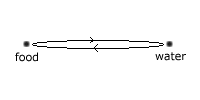 walk the 2 kilometres from one place to the other, from food to water and vice versa. And we can then say that it takes him a total of 4 hours a day to make the round trip to find and consume his daily needs of food and water. His idleness is thus (24 - 4)/24, or 83.3%. He can spend 83.3% of his time dozing or sunning or exploring.
walk the 2 kilometres from one place to the other, from food to water and vice versa. And we can then say that it takes him a total of 4 hours a day to make the round trip to find and consume his daily needs of food and water. His idleness is thus (24 - 4)/24, or 83.3%. He can spend 83.3% of his time dozing or sunning or exploring.
We may now imagine that another individual joins the first individual in walking between the two sources of food and water, such that there are now two men acting entirely independently of each other, finding and consuming food and water (of which there is an abundant supply). Assuming that both walk at the same speed, and find and consume food and water with the same ease, both will have the same idleness.
Given that from time to time these individuals find that they are occasionally delayed in moving from one place to the other, they both carry with them sufficient food and water for a day or more, so that they can eat and drink as they desire.
The first human society
So now we have two men walking to and fro between the sources of food and water, and spending their idle hours exploring, sunning themselves, etc. And they very frequently pass each other walking in opposite directions half way between the two places.
And when they pass going in opposite directions, it is usually the case that one has just eaten and has a full stock of food, but is now going to get water, and the other has just drunk, and has a full flask of water, and is going to collect food. And in this circumstance, what is more natural than that they exchange food for water, and save each other the trouble of getting them for themselves?
And when the exchange has been made, the one who has given away water finds he is now low on water, and the other finds that he is low on food. And so each turns around, and goes back the way he came, to restock.
And if they subsequently meet again the next day, and make exactly the same exchange, one will have collected food sufficient for both, and the other sufficient water for both, in anticipation of the exhange.
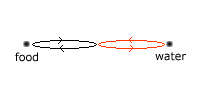 The result is that they now walk half the distance between the two points, on a round trip that takes one hour. In addition, instead of collecting enough food or water for one person, they collect enough for two, taking two hours. And the net result is that they now must work a total of three hours to meet their needs, gaining half of their nutritional requirements through exchange. Their idleness has increased to 87.5%, up 4.2% from when they acted independently of each other.
The result is that they now walk half the distance between the two points, on a round trip that takes one hour. In addition, instead of collecting enough food or water for one person, they collect enough for two, taking two hours. And the net result is that they now must work a total of three hours to meet their needs, gaining half of their nutritional requirements through exchange. Their idleness has increased to 87.5%, up 4.2% from when they acted independently of each other.
Now it may well be that this arrangement is allowed to lapse, because it requires the discipline to meet every day at an agreed time and place, and both are quite happy to sacrifice an hour of idleness a day to be able to be free of this discipline, and revert to an independent existence.
But now let us suppose that environmental conditions change such that it takes longer and longer to walk between the two points, and longer to collect food and water. Instead of it taking an hour to walk between the two places, it now takes 9 hours, and another 2 hours to to gather either food or water. It now takes them 22 hours to make the round trip to collect food and water, and their idleness falls to (24 - 22)/24, or 8.3%. If conditions were to worsen further, their idleness would fall to zero, and both would die.
However, if they were to renew their trading arrangement, collecting enough food or water for two, and walking halfway to meet and trade, the round trip would take 13 hours, and their idleness would be 45.8%. Now facing the prospect of death if they continue an independent existence, they will renew their trading arrangement, and observe strict discipline within a society of two in which they are now dependent upon each other for their survival.
And this example shows how previously autonomous and independent individuals come together to form a disciplined cooperative society. Autonomous independent existence becomes impossible, and joining a cooperative society the only option for continued survival.
But it is not only that hitherto independent individuals will be seeking to join a cooperative society as independent existence becomes increasingly difficult, but that such cooperative societies will welcome new members.
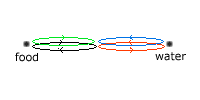 For if we imagine that two new members join, and these two members share the work of the two existing members, then each pair of individuals must now collect enough food or water for 4 people (8 hours of work), and one of them should carry sufficient food or water to trade (9 hours walking) - a total of 17 hours of work, or 8.5 hours each, and an idleness of 64.6%.
For if we imagine that two new members join, and these two members share the work of the two existing members, then each pair of individuals must now collect enough food or water for 4 people (8 hours of work), and one of them should carry sufficient food or water to trade (9 hours walking) - a total of 17 hours of work, or 8.5 hours each, and an idleness of 64.6%.
Thus a 4-person society is, in this example, nearly 20% more idle than a 2-person society. And an 8-person society would be 74% idle, an increase of 10%. And a 16-person society would be 78.6% idle, an increase of 5%. And so on - although real societies are undoubtedly far more complicated than in this simple example, and would not attain such high values of idleness. At some point, perhaps with one hundred or more members, the idleness of a society would cease to rise with new members joining, and new applicants would be turned away, perhaps to be welcomed by other, smaller societies.
In this account of the formation of human societies, it was dire necessity that forced once independent and autonomous humans to form the first human societies. As idleness fell, autonomous existence became increasingly precarious, while more idle small human societies needed new members. The transition from autonomous independent life to cooperative social life was forced by circumstances.
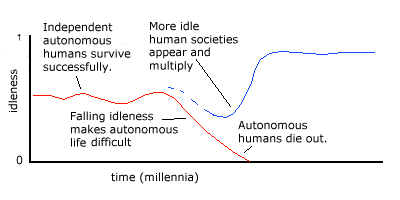
But while members of human societies gained in idleness, and hence in prosperity and security, they paid a price in lost autonomy. Men were no longer masters of their own lives, but part of a community in which they had rights and duties. In return for doing an allotted amount of work at a particular time and in a particular place, they received a sufficient share of the necessities of life. Members of human societies had to learn to keep promises, to obey orders, in ways they had never had to when they were each masters of their own lives. And where orders are given, there is implied a hierarchical system of society - one perhaps in which their were higher rewards for those at the top than the bottom.
And, while an independent autonomous existence remained non-viable, there was no exit from this society. Nobody could drop out. Or, if they did, or if they were expelled, their idleness plummeted - and they died.
Human Society
In the foregoing account of the formation of the first simple human societies, there is no kind of 'quantum leap' from autonomous individuality to social cooperation. Humans do not suddenly cease being individuals and become social animals. Human societies form because it is in the interest of some individuals to join cooperative societies, and in the interest of existing individual members of such societies to induct them as new members.
And it may have proved very difficult for new members to adapt to a social life in which they were expected to do as they were told, work when they were told to work, keep promises, obey laws, etc, etc. For an erstwhile autonomous nomad, used to deciding for himself what to do and when to do it, it may often have proved impossible to be so disciplined. It is not hard to imagine that new members of cooperative societies frequently proved shiftless, workshy, disobedient - and consequently may have very often been expelled.
The problem for human societies has always been that humans are recalcitrantly individual rather than social beings. Humans remain at heart the lawless, undisciplined, autonomous, independent nomads they were for millions of years before human society took shape, with its many demands, was forced upon them.
Nowadays, many thousands of years after human societies first formed, it is usual to think of humans as social beings, and cooperative human societies as in some sense normal and natural. But from the account just given, the formation of human societies was a desperate measure to escape extinction, and human societies were liferafts onto which threatened humanity climbed - and from which they long to one day disembark, and return to autonomous existence. To live in cooperative human societies with complex rules and regulations is no more natural than it is to live on a liferaft.
Human society might best be seen not as a permanent arragement, but a temporary one, and still temporary after tens of thousands of years. The goal of human economic and technical and ethical development is, according to Idle Theory, a growth in human idleness. And a growth in idleness entails a growth in freedom and autonomy. A 25% idle human society requires its members to be disciplined workers 75% of their time, but a 90% idle human society only requires such discipline for 10% of their time. The rest of the time they can do as they like. With rising idleness, the social demands upon individuals grow less and less, and individuals become more and more autonomous and independent. And so the more successful human society becomes at increasing the individual idleness of its members, the more a natural, autonomous, independent human nature can re-assert itself.
Earlier essay: The origin of bipedalism
Earlier essay: The predation of humans
